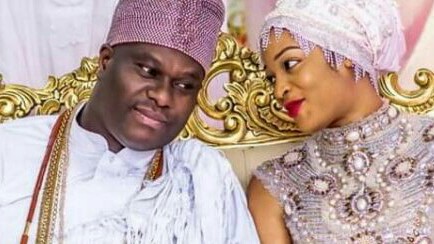Opinions
Oba Akeem Ogungbangbe and his tireless crusade for equal opportunities

By Sodiq Lawal Chocomilo
His Royal Majesty, Oba Akeem Olusayo Ogungbangbe, is marking the third anniversary of his accession to the throne of his forefathers as the Owaloko of Iloko-Ijesa. The ‘decisive’ man in Iloko-Ijesa palace, who was denied and delayed for nine years by some forces, has spent three years on the throne.
In the last three years, Oba Ogungbangbe has not agreed that he is a ruler. He prefers to be addressed as a leader. Rulers are the people who rule, while leaders are the people who lead. I have once argued that both are non-identical from one another, accusing the monarch of cajoling his people owing to his decision to stick to being addressed as a leader rather than a ruler.
On an occasion, I asked the monarch why he preferred being addressed as a leader rather than a ruler. “A leader listens to his people, while a ruler does not. A leader is someone you can look up to, while a ruler is someone you must obey.” Oba Ogungbangbe calmly responded, saying he wants to earn, not demand, the respect of his subjects through his actions.
Oba Ogungbangbe is not your regular king. He is special, different, and distinct. He is a Muslim but bears Benjamin. His late father died in 2002 as the Chief Imam of Iloko-Ijesa. Like a father, like a son. His father was a religiously tolerant person who gave equal access to all in his school, irrespective of religion. Despite his rich Islamic background, the Christian Association of Nigeria (CAN), Iloko-Ijesa, and other faithful use the open space in his palace for fellowship.
During Easter or Christmas, he associates with Christians. In the month of Ramadan, he associates with Muslim faithfuls. During Obalogun festivals, Oba Ogungbangbe wakes up as early as 3 a.m. to join the procession to historic sites in the town and does not miss showering prayers on his people at every historic site. He expressly permits the celebration of the Olokun and New Year festivals without restraint.
Aworo could not hide his excitement when he was thanking and praying for the monarch’s administrative and financial support. I watched how each indigenous group, including hunters, was hailing the monarch for his many efforts in building the town and allowing peace to reign. Oba Ogungbangbe told the crowd that he should not be flattered because he still has a lot of ideas to execute or implement. Yes, Benjamin Disraeli was right about true royals. “Everyone likes flattery, and when you come to royalty, you should lay it on with a trowel.”
His major achievements are in education and employment opportunities. Aside from employing temporary staff, he pays monthly to assist public teachers at Osowusi Grammar School. He has a long list of indigenes who are benefiting from his scholarship scheme from primary to tertiary education. He has empowered some youths with quality tools for vocational practice, and those who were lucky to be employed through his intervention are not few in number.
Oba Ogungbangbe is not also a skit-maker in robes. He has problems with indiscipline and favoritism. Barely a year after he was crowned, he declared that scholarship opportunities should only be made available for brilliant sons and daughters of the needy and poor. He said any kid whose parents can afford primary or secondary education should not be allowed to take part in the scholarship examination. He added to the scholarship slots for more opportunities for the poor and disadvantaged.
His kind of royalty does not accommodate laziness and indiscipline. I have seen him driving around the town in person. Whenever you asked him, he would tell you that his driver is also a family man who deserves to rest and play with his kids. For Oba Ogungbangbe, leadership, or royalty, is service to the people. He is not the kind of leader who sits flamboyantly in his palace and asks subjects to run errands for the people. He supervises and monitors community projects.
When Oba Akeem Olusayo Ogungbangbe appears in public, he carries so many rare attributes of a special person. The Owaloko of Iloko-Ijesa, like many, is not defined by material possessions like cars, houses, or rustles of cash in his pockets but rather by the exemplary lifestyle of a true royal. Oba Ogungbangbe consumes ‘humility’ as a daily tablet. He does not talk or act hysterically. He doesn’t act in ways that will make him infamous or flaunt his fortune to attract attention. Yes, Philip Treacy was correct. Royalty is completely different from celebrity. Royalty has a magic all its own.
For Oba Ogungbangbe, royalty is a demanding, difficult job and a selfless devotion to the people. He is constantly thinking of ways to make Iloko-Ijesa better. You will find out when you talk to the king about the town. He considers himself to be an occupier of a throne with greater responsibilities. When you see Oba Ogungbangbe, you see a royal father who is not only driven by passion to serve his people but also troubled by his vow to never abandon the people, especially his forefathers who helped build the town.
As he marks his third anniversary on the throne, Oba Akeem Ogungbangbe still believes he has not done much for his people. In all fairness, Oba Akeem Ogungbangbe has reasons to be afraid. His own father, the late Alhaji Taiwo Ogungbangbe, founded the first post-secondary school in the town, now Osowusi Muslim Commercial High School, Iloko-Ijesa. He comes from a prestigious family ‘Ogungbangbe’ known for respect, hard work, and devotion to his place of living and work. Iloko-Ijesa is a masterpiece of what natives can do for their town. From roads to businesses to mighty buildings, all are genuine efforts from natives. You cannot lead a town like Iloko-Ijesa and be satisfied or comfortable, no matter how big your achievements are.

Oba Akeem Ogungbangbe
Being an Owaloko comes with a lot of sacrifice and demands. Whoever enjoys a luxurious lifestyle, partying, or living flamboyantly must not aspire to become the king of Iloko-Ijesa. The king (Owaloko) serves the people, not the other way around. In Iloko-Ijesa, the king cannot sell land; only the people or council can. No king of Iloko-Ijesa can enjoy the palace like modern kings. You are certainly compelled by some mysteries to work for the town and its people. This is evident in the lives of past leaders who led the town to prosperity with their God-given intellect, resources, and positive drives.
As Oba Akeem Olusayo Ogungbangbe continues to paddle the affairs of the Iloko-Ijesa kingdom as the true custodian of culture and tradition, I join prominent sons and daughters to celebrate the multi-dimensional king who made his palace a home for all.
Sodiq Lawal Chocomilo writes from Osogbo, the capital of Osun State.
-

 Celebrities6 days ago
Celebrities6 days agoOriyomi Hamzat hospitalised after Ibadan stamdpede
-

 News6 days ago
News6 days agoOoni’s Ex-Wife Arrested Over Alleged Death of 35 Children In Ibadan
-

 News6 days ago
News6 days agoOoni breaks silence over Ibadan stamdpede, sends message to party involved
-

 Osun News4 days ago
Osun News4 days agoOsogbo agog as Osun former Deputy Gov, Titi Tomori-ponle launches TTP Foundation
-

 News1 day ago
News1 day agoCourt sends Oriyomi Hamzat, Ooni’s ex-Queen, School principal to remand
-

 Osun News5 days ago
Osun News5 days agoExclusive Interview with Aaraj, Speaks about Kejebu, Adeleke’s performance, Ajagunla’s Petition, AEF, Others
-

 Politics5 days ago
Politics5 days agoCourt Sacks APC State Chairman
-

 Metro/Crime1 day ago
Metro/Crime1 day agoGunmen invade palace, as Monarch jump fence to escape





